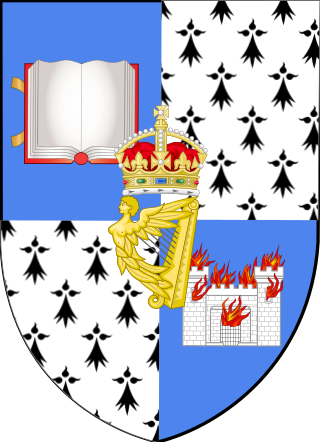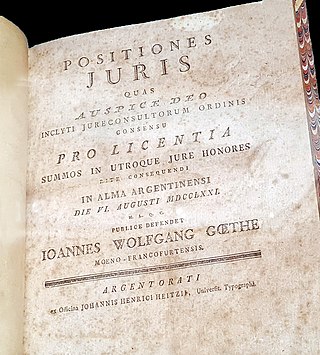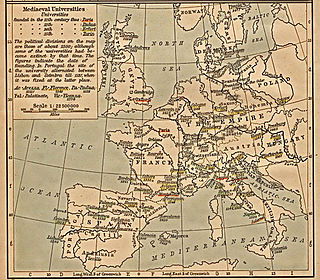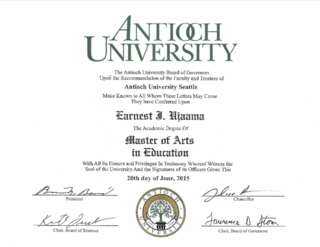
Pope Adrian VI, born Adriaan Florensz Boeyens, was head of the Catholic Church and ruler of the Papal States from 9 January 1522 until his death on 14 September 1523. The only Dutchman to become pope, he was the last non-Italian pope until the Polish John Paul II 455 years later.
The Third Council of the Lateran met in Rome in March 1179. Pope Alexander III presided and 302 bishops attended. The Catholic Church regards it as the eleventh ecumenical council.

A medieval university was a corporation organized during the Middle Ages for the purposes of higher education. The first Western European institutions generally considered to be universities were established in present-day Italy, including the Kingdoms of Sicily and Naples, and the Kingdoms of England, France, Spain, Portugal, and Scotland between the 11th and 15th centuries for the study of the arts and the higher disciplines of theology, law, and medicine. These universities evolved from much older Christian cathedral schools and monastic schools, and it is difficult to define the exact date when they became true universities, though the lists of studia generalia for higher education in Europe held by the Vatican are a useful guide.

The University of Dublin, corporately designated the Chancellor, Doctors and Masters of the University of Dublin, is a university located in Dublin, Ireland. It is the degree-awarding body for Trinity College Dublin. It was founded in 1592 when Queen Elizabeth I issued a charter for Trinity College as "the mother of a university", thereby making it Ireland's oldest operating university. It was modelled after the collegiate universities of Oxford and of Cambridge, but unlike these other ancient universities, only one college was established; as such, the designations "Trinity College" and "University of Dublin" are usually synonymous for practical purposes.
An academic degree is a qualification awarded to a student upon successful completion of a course of study in higher education, usually at a college or university. These institutions often offer degrees at various levels, usually divided into undergraduate and postgraduate degrees. The most common undergraduate degree is the bachelor's degree, although some educational systems offer lower-level undergraduate degrees such as associate and foundation degrees. Common postgraduate degrees include engineer's degrees, master's degrees and doctorates.

A master's degree is a postgraduate academic degree awarded by universities or colleges upon completion of a course of study demonstrating mastery or a high-order overview of a specific field of study or area of professional practice. A master's degree normally requires previous study at the bachelor's level, either as a separate degree or as part of an integrated course. Within the area studied, master's graduates are expected to possess advanced knowledge of a specialized body of theoretical and applied topics; high order skills in analysis, critical evaluation, or professional application; and the ability to solve complex problems and think rigorously and independently.

A doctorate or doctoral degree is a postgraduate academic degree awarded by universities and some other educational institutions, derived from the ancient formalism licentia docendi.
James Beaton (1473–1539) was a Roman Catholic Scottish church leader, the uncle of David Cardinal Beaton and the Keeper of the Great Seal of Scotland.
The Regent House is the governing body of the University of Cambridge. It consists of most academic and academic-related staff of the university's colleges and departments. It currently has more than 3,000 members.
Godfrey of Fontaines, in Latin Godefridus de Fontibus, was a scholastic philosopher and theologian, designated by the title Doctor Venerandus. He made contributions to a diverse range of subjects ranging from moral philosophy to epistemology. However, he is best known today for his work on metaphysics.

A licentiate is an academic degree present in many countries, representing different educational levels. It may be similar to a master's degree when issued by pontifical universities and other universities in Europe, Latin America, and Syria.

Jakob Ulvsson was Archbishop of Uppsala, Primate of the Roman Catholic Church of Sweden 1469–1515 and the founder of Uppsala University in 1477.

Studium generale is the old customary name for a medieval university in medieval Europe.

A Master of Arts is the holder of a master's degree awarded by universities in many countries. The degree is usually contrasted with that of Master of Science. Those admitted to the degree have typically studied subjects within the scope of the humanities and social sciences, such as history, literature, languages, linguistics, public administration, political science, communication studies, law or diplomacy; however, different universities have different conventions and may also offer the degree for fields typically considered within the natural sciences and mathematics. The degree can be conferred in respect of completing courses and passing examinations, research, or a combination of the two.
A magister degree is an academic degree used in various systems of higher education.
An ijazah is a license authorizing its holder to transmit a certain text or subject, which is issued by someone already possessing such authority. It is particularly associated with transmission of Islamic religious knowledge. The license usually implies that the student has acquired this knowledge from the issuer of the ijaza through first-hand oral instruction, although this requirement came to be relaxed over time. An ijaza providing a chain of authorized transmitters going back to the original author often accompanied texts of hadith, fiqh and tafsir; but also appeared in mystical, historical, and philological works, as well as literary collections. While the ijaza is primarily associated with Sunni Islam, the concept also appears in the hadith traditions of Twelver Shia.

The Oklahoma State Regents for Higher Education is the agency of the government of Oklahoma that serves as the governing body of the Oklahoma State System of Higher Education, which is the largest provider of higher education in the state of Oklahoma. The State System consists of all institutions of higher education in Oklahoma that are supported by direct legislative appropriations from the Oklahoma Legislature.
The Council of the University of Cambridge is its principal executive and policy making body, having responsibility for the administration of the university, for the planning of its work, and for the management of its resources. Since the Regent House is the governing body of the university, however, the Council must report and be accountable to the Regents through a variety of checks and balances. It has the right of reporting to the university, and is obliged to advise the Regent House on matters of general concern to the university. It does both of these by causing notices to be published by authority in the Cambridge University Reporter, the official journal of the university.

Jöns Bengtsson (Oxenstierna), in Latin known as Johannes Benedicti de Salista, was a Swedish clergyman, canon law scholar and statesman who served as Archbishop of Uppsala (1448–1467). He was the also the regent of Sweden under the Kalmar Union in 1457, shared with Erik Axelsson (Tott), and alone from 1465 to 1466.

In a monarchy, a regent is a person appointed to govern a state pro tempore because the actual monarch is a minor, absent, incapacitated or unable to discharge their powers and duties, or the throne is vacant and a new monarch has not yet been determined. The rule of a regent or regents is called a regency. A regent or regency council may be formed ad hoc or in accordance with a constitutional rule. Regent is sometimes a formal title granted to a monarch's most trusted advisor or personal assistant. If the regent is holding the position due to their being in the line of succession, the compound term prince regent is often used; if the regent of a minor is their mother, and she is wife or widow of the king, she would be referred to as queen regent.











